Choosing the Best Pellets for Parrots' Health

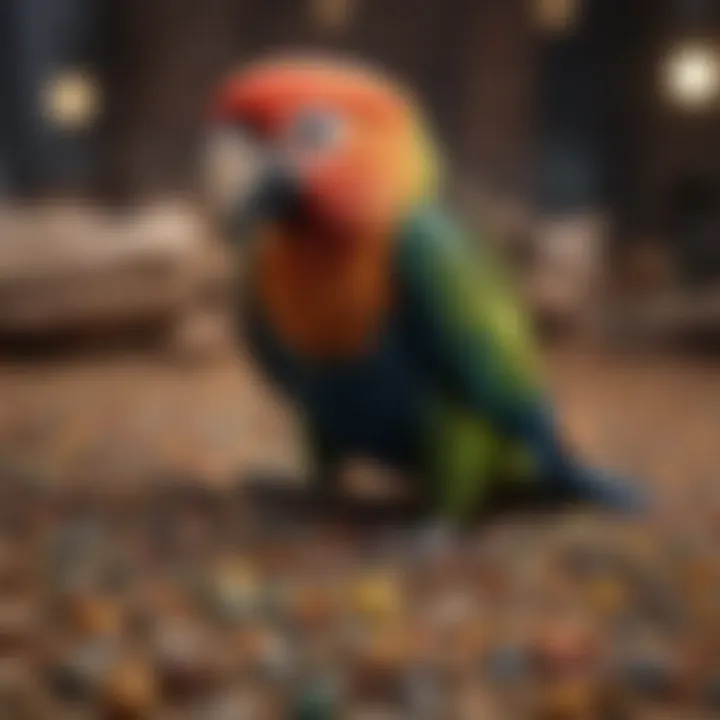
Intro
Choosing the right pellets for your parrot is akin to finding that perfect puzzle piece that clicks just right. Why? Because understanding their nutritional needs is crucial to their health, happiness, and overall well-being. With various options on the market, it can feel like wandering through a never-ending maze. This guide will illuminate the path, helping you understand the essentials that make up a good pellet diet.
When you dive into the specifics, it becomes evident that not all pellets are created equal. The type of ingredients, the nutritional profile, and the varying needs of different parrot species all influence which pellets may work best for your feathered friend. Moreover, integrating pellets into their diet isn't just a walk in the park; it requires patience and strategy. As we explore the topic, we'll unearth various brands and their unique offerings, providing insights into what might be a perfect match for your avian companion.
Additionally, understanding a parrot's specific dietary requirements is fundamental. Just like humans have preferences and restrictions, so do our feathered friends. This article will provide a thorough walkthrough of the key points, painting a clear picture of how to select and introduce the optimal pellets for your parrot, ensuring they're lively and thriving.
Care Tips
Ensuring that your parrot receives the best nutrition starts with foundational care routines. Here's how:
Daily Care Routines
An effective daily care routine can set the stage for your parrot’s health. Regularly scheduled feeding times help establish consistency. Keep a calendar noting times for feeding, cleaning, and even simple interactions. For instance, a parrot may react strongly to morning routines, often anticipating breakfast with excitement.
Cage Setup and Maintenance
The cage setup greatly impacts your parrot’s comfort and willingness to explore new pellets. A well-organized cage that mimics their natural environment can spark curiosity and encourage them to sample new foods. Choose a spacious cage filled with perches, toys, and safe materials. Maintain cleanliness by daily spot checks and regular deep cleaning to avoid mold or waste buildup that could taint their food.
Hygiene and Cleaning Practices
Cleanliness is next to healthiness. Remember that hygiene involves not just the cage, but also the utensils you use for feeding. Wash food bowls daily; once per week, do a thorough scrub and rinse to keep any remnants from degrading food quality.
Seasonal Care Adjustments
Birds can be sensitive to changes in climate. As the seasons shift, so should your care practices. In warmer months, check for heat stress and hydration. Come winter, fine-tune humidity levels to keep your parrot comfortable. These adjustments can pave the way for better feeding habits and overall health.
Behavioral Insights
Understanding your parrot's behavior can give clues about dietary needs and preferences.
Understanding Bird Body Language
Every ruffle and flutter communicates something important. A parrot that turns away from a specific pellet may not be uninterested; it could be that their body language is hinting at something off-putting about the scent or texture. Learning these cues can help refine your approach to pellet feeding.
Common Behavioral Issues and Solutions
Sometimes, a parrot may exhibit unfavorable behaviors such as excessive screeching or feather plucking. These behaviors can stem from dietary deficiencies. Observing behavior patterns when changing their diet can unearth the reasons behind these reactions.
Positive Reinforcement Techniques
Using treats or praise can create positive associations with pellets. If you introduce a new type of pellet, try to reward your parrot when they show even the slightest interest. Over time, they’ll start to connect pellets with their experiences of success and satisfaction.
Social Interaction Needs
Parrots are social creatures. Spending time with them during feeding time can make all the difference. Engage them in conversation or mimic their calls while you offer pellets. This social interaction can enhance their overall acceptance of a varied diet.
Nutrition Guides
A well-balanced parrot diet is intricate. Let’s break down the essentials:
Essential Diet Components
Parrots thrive on a blend of grains, seeds, fruits, and vegetables along with pellets. Consider pellets as the backbone, supplying the necessary vitamins and minerals. Look for brands that source whole ingredients without fillers.
Safe and Toxic Foods
Certain foods can be harmful or even fatal for your feathered companions. Avocado, chocolate, and onion are among the top culprits. Always keep these hazardous items out of reach and educate yourself on safe snacks, such as blueberries and bell peppers.
Supplements and Treats
While pellets offer foundational nutrition, occasional supplements may be beneficial. Products enriched with omega fatty acids can support skin and feather health. Treats, though indulgent, should feature healthy options like nuts in moderation.
Feeding Strategies for Different Species
Not all parrots share the same dietary habits. African Greys, for instance, might need a diet richer in calcium, whereas Budgerigars may thrive with lower-fat content. Research and align the feeding strategy to each species’ needs.
"A well-fed parrot is a happy parrot, and happy parrots lead to happy owners."
Wellness and Health
Keeping your parrot healthy goes beyond diet; wellness routines are equally important.
Routine Health Checkups
Regular vet visits should be part of your parrot’s life. These checkups can ensure they aren't hiding any health issues that could impact their eating habits, from beak malformations to feather plucking.
Identifying Symptoms of Illness
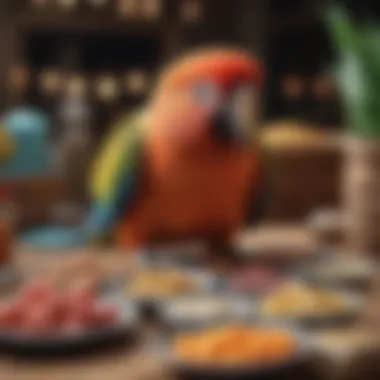
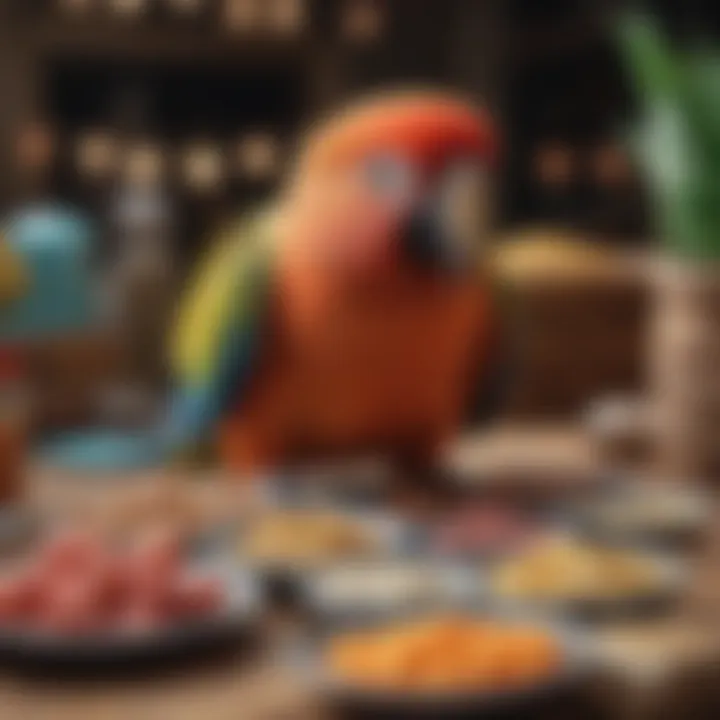
Watch out for subtle signs of illness like changes in vocalization or the consistency of droppings. Familiarity with typical behavior can help you react promptly if anything seems off.
Preventative Care and Vaccinations
Preventative care isn’t a one-off task. Keep vaccinations current and utilize preventive treatments to fend off common parasites, which can drain your bird’s energy, affecting their appetite.
Mental and Emotional Well-being
A healthy diet should also cater to mental stimulation. Provide toys and activities that match their intelligence level, keeping them engaged. The happier they are, the better they'll eat.
Enriching Activities
Parrots are infinitely curious, and keeping them entertained aids in their mental health.
Toys and Playtime Ideas
Invest in safe, durable toys that challenge their intelligence. Rotate toys regularly to keep things fresh and exciting.
Training and Tricks
Incorporating training into playtime can also stimulate their minds. Simple commands or tricks can break the monotony. Rewards can be an excellent tool for encouraging these learning sessions.
Outdoor Activities and Interaction
When weather permits, take your parrot outdoors. Fresh air and exploration can reinvigorate their spirits and pique their interest in new foods.
DIY Projects for Mental Stimulation
Creating homemade toys or foraging activities can turn mealtime into a game. Even simple projects with paper towel rolls can be transformed into engaging puzzles, guiding them to discover hidden treats.
Understanding Parrot Nutrition
Understanding parrot nutrition is not just a matter of keeping your feathered friend fed; it's the cornerstone of their health and happiness. Parrots, with their vivid colors and charismatic personalities, demand a diet that aligns with their diverse nutritional needs. The efficacy of a pellet diet depends largely on how well it replicates their natural foraging habits while supplying vital nutrients. With numerous dietary options available, being aware of what ingredients are beneficial ensures that the well-being of these intelligent birds is prioritized. Failing on this front could lead to deficiencies or imbalances that manifest in health issues, behavioral problems, or a shortened lifespan. Hence, a well-rounded grasp on what constitutes parrot nutrition is indispensable for any responsible bird owner.
Essential Nutrients for Parrots
Proteins
Proteins are central to a parrot's diet as they play a crucial role in growth, tissue repair, and overall body maintenance. Parrots require a significant amount of protein to support their active lifestyles, especially the larger species that are known for their acrobatics and high energy levels. A high-quality protein source can be derived from seeds, legumes, and specialized pellets designed for avian consumption.
The key characteristic that makes proteins a beneficial choice is their amino acid content, which is necessary for many bodily functions. Specifically, essential amino acids must come from the diet, as birds cannot synthesize them. Oftentimes, pellets formulated for parrots are enriched with specific proteins to ensure that the birds receive adequate amounts. A unique feature is the digestibility of the protein sources; those derived from animal products like egg can be easier for parrots to process compared to plant-based alternatives. However, one disadvantage is that relying solely on high-protein food can lead to imbalanced diets if not carefully monitored.
Vitamins and Minerals
Vitamins and minerals are pivotal players in the orchestra of parrot nutrition. These micronutrients facilitate numerous biochemical processes that keep a parrot vibrant and thriving. From boosting the immune system to enhancing feather health and aiding in bone growth, adequate vitamins and minerals can make the difference between a healthy bird and one struggling with deficiencies.
A notable aspect of vitamins is the specific roles they play: for example, Vitamin A is crucial for vision and skin health, while Vitamin D is vital for calcium absorption, which is significant for bone strength. Among mineral content, calcium and phosphorus are particularly critical. The inclusion of a variety of fresh fruits and vegetables not only covers these nutritional bases but adds variety to a parrot's diet. However, many pet owners overlook specific vitamin and mineral needs, leading to reliance on pellets alone, which may not fully meet these requirements, therefore careful monitoring is essential.
Fats and Carbohydrates
Fats and carbohydrates are macronutrients that provide energy, which is of great importance for the active and sometimes boisterous lifestyle of parrots. Fats serve as a concentrated energy source, while carbohydrates, particularly from whole grains and fruits, offer both energy and fiber which support digestion.
The key characteristic of fats is that they are a necessary part of the diet for essential fatty acids that assist in maintaining healthy skin and feathers. From a comparative perspective, pellets typically contain a balanced fat content; however, the challenge lies in ensuring that the fats sourced are high-quality and not overly processed. In contrast, carbs play their part in fueling activity but can sometimes lead to obesity if consumed in excess without physical exercise. Finding the right balance between these two contributes to overall health but requires diligence in monitoring the types and quantities offered.
Role of Pellets in a Balanced Diet
The role of pellets in a balanced diet cannot be overstated. Pellets are designed to offer a comprehensive mix of the necessary nutrients that parrots require, ideally replicating what they would find in the wild. Unlike the hit-or-miss approach of feeding seeds alone, which might lack essential ingredients, pellets aim to deliver a consistent and nutrient-dense option.
Using pellets as a foundation can simplify nutritional management for parrot owners. They reduce the risk of nutritional deficiencies by ensuring that a bird's diet remains stable, harmonizing well with fresh foods. However, it is crucial to recognize that not all pellets are created equal; the quality and ingredients can vary widely, thus necessitating thorough research before selecting the best option. Integration of pellets alongside fresh foods mimics natural foraging and provides sensory stimulation, making mealtime a more engaging experience for parrots.
"A well-fed parrot is a happy parrot, but understanding what to feed them can be a winding path."
In summary, understanding parrot nutrition is about more than just knowing what to feed them; it is about creating a diverse and balanced diet that supports their needs fully. Each nutrient plays a distinct role that contributes to the parrot's overall health and lifestyle, making it essential to get it right.
Types of Pellets Available
Understanding the different types of pellets available for parrots is crucial for any bird owner. Choosing the right pellets can significantly impact your feathered friend's health and overall well-being. Not all pellets are created equal; they serve various purposes, target different nutritional needs, and are made from diverse ingredients. This section will provide clarity on commercially available pellets and homemade pellet options, making your selection process smoother and more informed.
Commercially Available Pellets
When it comes to commercially available pellets, the choices abound. These pellets are usually developed by companies with specific formulations aimed at meeting the nutritional requirements of parrots. They come in various brands, each boasting its own unique ingredient mix and benefits. Here are some aspects to consider:
- Nutritional Composition: Most reputable brands provide detailed nutritional information. Look for pellets that have a balance of proteins, carbohydrates, fats, vitamins and minerals. For example, a standard pellet may contain ingredients like corn, soybeans, and various seed oils.
- Life Stage Formulations: Some brands offer formulations based on the life stage of the parrot. You might find pellets designed for baby, adult, or senior birds. Each stage comes with differing needs, so pay close attention to these details.
- Species-Specific Options: Different species of parrots have unique dietary needs. Brands like Harrisons and Zupreem offer species-specific formulas that cater to the distinct nutritional requirements of birds such as African greys or Amazon parrots.
- Additives and Preservatives: It's essential to scrutinize ingredient lists for artificial additives or preservatives. Opt for products that use natural preservatives, as synthetic ones can sometimes have negative health effects.
In the world of commercial pellets, quality matters.
"Not all that glitters is gold."
Take your time to compare brands and understand their reputations. Speaking with fellow parrot owners or checking forums like reddit.com can provide valuable insights into which brands are worth your investment.
Homemade Pellet Options
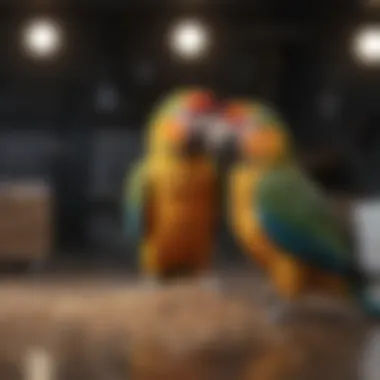
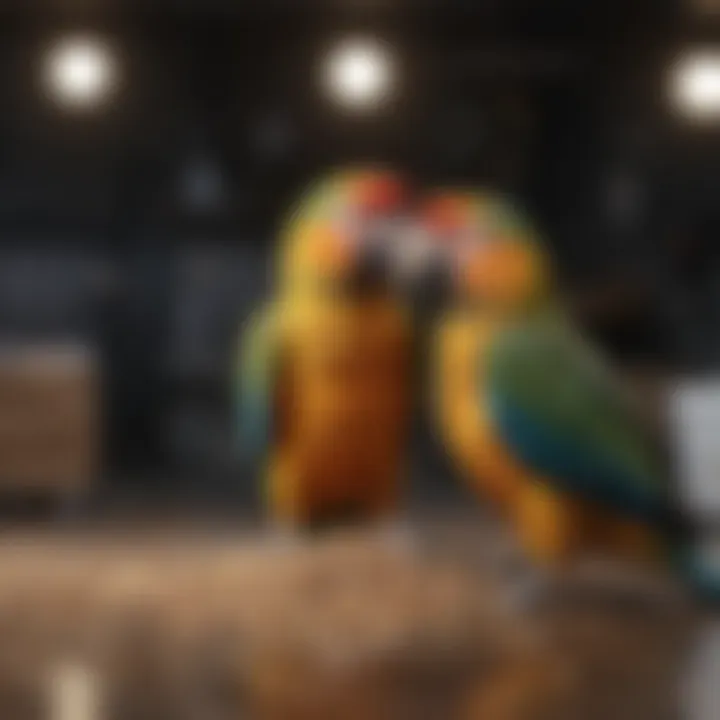
Making homemade pellets can be a rewarding endeavor for devoted parrot owners. While it may seem daunting at first, crafting pellets at home allows you to control the ingredients and adjust them according to your parrot's needs. Here are several pros and cons to consider:
- Customization: By making your own pellets, you can cater to your bird’s specific preferences or restrictions. For example, if your parrot has a sensitivity to certain grains, you can easily adjust the recipe to exclude them.
- Quality Control: You have the final say over what goes into the pellets. Using high-quality, non-GMO ingredients ensures that your parrot is getting the best nutrition possible.
- Freshness: Homemade pellets can be made in smaller batches, which may help ensure they're fresher than some store-bought options that might have sat on shelves for a while.
However, it’s important to note the challenges that come with making pellets:
- Time-Consuming: Preparing and cooking your own pellets is more labor-intensive compared to simply purchasing a bag. This may not be feasible for everyone.
- Nutritional Balance: It may be difficult to achieve the right balance of nutrients without proper research or guidance. Consulting with a veterinarian knowledgeable in avian nutrition is highly recommended.
To create basic homemade pellets, consider simple ingredients like whole grains, vegetables, and some form of protein. There are various online resources that can guide you through recipes and proportions.
In summary, understanding the types of pellets available allows you to choose wisely. Whether you go for commercially produced options or decide to embark on making your own, keep your parrot’s unique needs in mind. Efforts in pellet selection pave the way for a healthier, happier companion.
Evaluating Quality of Pellets
When it comes to the well-being of parrots, selecting high-quality pellets can make all the difference. Not only do pellets serve as a fundamental component of a balanced diet, but they also help in preventing a range of nutritional deficiencies. As a discerning parrot owner, understanding how to evaluate the quality of pellets is crucial. This section aims to shed light on important factors that play a role in assessing pellet quality, including ingredient lists, nutritional breakdowns, and the brand's reputation. By prioritizing these aspects, one can ensure their feathered friends are receiving optimum nutrition suitable for their unique needs.
Ingredient Lists
The ingredient list is the first step in evaluating the quality of parrot pellets. It essentially serves as the roadmap to what your bird consumes. Generally, high-quality pellets should have whole food ingredients listed at the top, reflecting a natural and nutrient-rich composition. Look for specific ingredients, such as whole grains, legumes, fruits, and vegetables. On the other hand, steer clear of meals or by-products that may compromise nutritional value.
- Whole ingredients often indicate better quality and more nutrition.
- Ingredients like corn or wheat, while common, should be supplemented with diverse options to ensure a wide range of nutrients.
- Avoid pellets with artificial preservatives, colors, or flavors which can be harmful.
"Understanding what goes into your parrot's diet isn't just about nutrition; it's about their health and happiness."
Nutritional Breakdown
Once you've analyzed the ingredient list, it is equally important to look at the nutritional breakdown. This detailed information reveals the percentage of key nutrients, including proteins, fats, carbohydrates, vitamins, and minerals. A well-balanced pellet should ideally have a mix that mirrors a parrot's natural diet. For example, larger species may require higher protein levels, while smaller varieties may benefit from a balanced approach.
- Proteins: Should come primarily from sources like soy or pea protein and contribute significantly to muscle maintenance.
- Fats: Essential for energy but should be monitored carefully to prevent obesity. Healthy fats such as those from flaxseed are preferable.
- Vitamins and Minerals: Must be included in appropriate percentages for optimal health, especially calcium and vitamin D3, which are vital for bone health.
Before deciding on a specific pellet, check whether the nutritional analysis matches your parrot's age, size, and activity levels, ensuring they receive an adequate diet tailored to their needs.
Brand Reputation
In assessing the quality of parrot pellets, the brand's reputation can’t be overlooked. Some brands boast years of experience and research backing their formulations, which can provide peace of mind. Where possible, look for independent reviews to gather insights into the quality and effectiveness of various products. Consider the following when evaluating brand reputation:
- Manufacturer Transparency: A brand that openly shares its sourcing methods and provides detailed information about its ingredients usually prioritizes quality.
- Reviews and Recommendations: Check forums like reddit.com or engage in facebook groups to hear real user experiences. High satisfaction rates often signal a reliable product.
- Certifications: If the brand adheres to safety and nutritional guidelines, such as those from the Association of American Feed Control Officials (AAFCO), it often indicates a commitment to quality.
By taking an informed approach to evaluating pellet quality, you can set the stage for a healthier, happier life for your parrot.
Top Pellets for Parrots
When it comes to ensuring the well-being of your feathery friends, the type of pellets you choose can make a world of difference. Not only do they serve as a primary source of nutrients, but the right blend of pellets helps mimic a more natural diet, thus enhancing your parrot's overall health. Selecting high-quality pellets involves understanding what makes them effective and beneficial for your particular species of parrot, along with the various brands available. Below, we dive into commercial brands that have earned their reputation in the avian community and also look at specialty pellets tailored for specific parrot species.
Commercial Brands Overview
The market is brimming with companies producing pellets aimed at meeting the diverse needs of parrots. Understanding the commercial brands available can be somewhat bewildering. However, grasping the unique selling points of each brand will make the selection process smoother.
Some well-regarded commercial brands include:
- Harrison's Bird Foods: Their organic line is particularly prized for not having artificial additives. They emphasize a holistic approach to avian health.
- Roudybush: Known for its carefully crafted diets that ensure optimal nutrition, Roudybush pellets are highly digestible, promoting better absorption of nutrients.
- Zupreem: This brand offers a variety of pellet sizes and flavors, catering to the preferences of different parrot breeds.
It's vital to pay attention to not just the brand itself, but also what goes into their pellets. Higher-quality brands often use whole ingredients that are rich in vitamins and minerals. They avoid fillers and artificial coloring, ensuring that what your bird eats is as nutritious as it is appetizing. Many pet bird owners recommend conducting thorough research, including checking user reviews and ingredient lists, to make an informed choice.
Specialty Pellets for Specific Species
Just like humans, birds can be picky about their food! Different species of parrots have distinct dietary requirements which may not be addressed by generic pellet formulas. Thus, specialty pellets have been created to meet these needs.
For example:
- African Grey Parrots: They particularly benefit from pellets that are rich in calcium and vitamin A, as they are prone to deficiencies. Brands that focus on these needs can promote longevity and health.
- Amazon Parrots: Knowing that Amazon parrots enjoy a more varied diet, specialty formulations that include fruit flavors cater to their preferences and ensure they are also getting necessary nutrients.
- Macaws: Large species like macaws need pellets that are designed with higher fat content, contributing to their energy requirements while still supporting their overall health.
In summary, selecting the right pellets can be crucial, especially for parrot species needing tailored nutrition. Navigating through commercial options as well as species-specific choices could tremendously affect your birds' life quality.
"The food your parrot eats can either build it up or tear it down, making the selection of pellets an investment in their health and happiness."
By taking the time to understand the differences among pellet brands and specialized options, you empower yourself as a parrot owner to make decisions that will benefit both the dietary needs and the happiness of your feathered companions.
Transitioning to Pellets from Seeds
Transitioning your parrot from seeds to pellets is a fundamental shift that significantly impacts their health and nutrition. Seeds often lack the comprehensive nutritional profile necessary for a parrot's long-term well-being. Although many birds become attached to their seed diets, a thoughtful transition can introduce the benefits of pellets, which are designed to meet their dietary needs more effectively. The key is to approach this change with sensitivity and awareness of how your parrot adapts to new foods.
Understanding Resistance to Change
Parrots are creatures of habit. Just like we may opt for our favorite foods, birds, too, develop preferences, often becoming reliant on their familiar seeds. There's a strong sense of security in what they know, which can manifest as resistance to trying new things—specifically pellets. This resistance can stem from differing tastes, textures, or even the bird's instinctual behaviors. Parrots are naturally inclined to be wary of unfamiliar items, as it could represent a potential danger in the wild.
🐦 Understanding that this behavior is normal is the first step. For example, a budgie accustomed to a seed mix may not immediately recognize the nutritional value in a small, round pellet. Experiencing some reluctance is common, and that’s why patience is essential during this transition process.
Gradual Prolusion Strategies
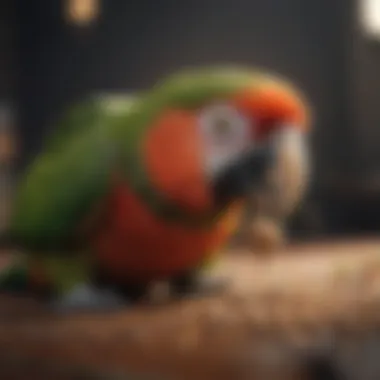
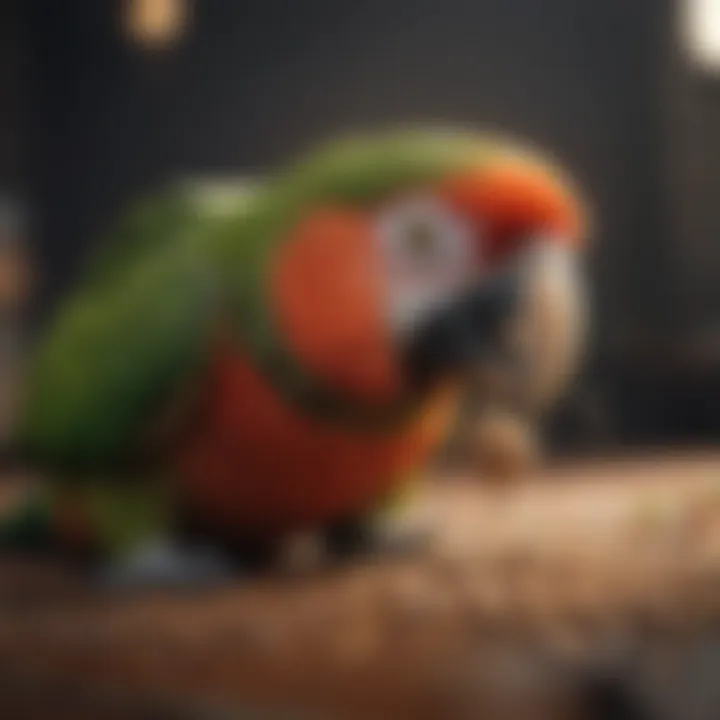
One effective way to ease your parrot into this new diet is through gradual introduction strategies. This approach ensures that your bird becomes familiar with pellets over time without feeling overwhelmed. Here are some practical steps you can take:
- Mix it Up: Begin by mixing a small amount of pellets into the existing seed mix. Gradually increase the proportion of pellets over days or weeks to allow your parrot to adjust.
- Use Appeal: Serve pellets alongside fresh fruits or vegetables that your bird enjoys. This invites curiosity and leads them to explore other foods.
- Timing is Key: Offer pellets during peak feeding times when your parrot is hungriest. Their willingness to try new foods increases, especially when they are more interested in eating.
- Monitor and Adapt: Keep an eye on your parrot's behavior during this transition. Should they refuse to eat pellets, don't despair; a little adjustment during the process can help. You might try offering newer brands or types of pellets to see what attracts their fancy.
By recognizing their resistance and employing strategies that respect a parrot's natural tendencies, you’ll create a positive pathway to integrating pellets into their diet.
"Introducing new foods to a parrot is not just about replacing one with another; it’s about broadening their horizons, ensuring they have the right nutrients tucked in their beaks for a healthier lifestyle."
In summary, transitioning a parrot from seeds to pellets is not simply a switch of diets, but an important journey towards elevating their nutritional intake. By understanding their resistance and applying gradual introduction strategies, you foster a relationship with food that prioritizes their health and well-being.
Common Misconceptions about Pellets
When it comes to feeding parrots, the discourse often swirls around pellets. Many parrot owners hear a chorus of recommendations that can drown out any critical thinking about what their birds actually need. This section aims to untangle a couple common misconceptions about pellets, offering a clearer understanding for pet bird enthusiasts. Recognizing these misconceptions helps ensure that your feathered friends receive a balanced diet tailored for their unique requirements.
Pellets are The Only Essential Food
One of the most widespread beliefs among bird owners is that pellets are the be-all and end-all of avian nutrition. While it's true that pellets are formulated to deliver a substantial portion of essential nutrients, this idea can be misleading. Relying solely on pellets can create an imbalanced diet that lacks the natural variety birds would find in the wild.
Consider the following points:
- Natural Diet Variability: In nature, parrots consume a wide range of foods, including fruits, vegetables, seeds, and flowers. Their digestive systems are adapted to process this diverse food, making it critical to replicate that variability in captivity.
- Fresh Foods are Important: Incorporating fresh fruits and vegetables alongside pellets can enhance the meal with additional vitamins and minerals. Foods such as carrots, apples, and leafy greens can offer textures and tastes that pellets simply can’t fulfill.
- Behavioral Engagement: Foraging for food is a natural behavior for parrots. When pigeonholed by just pellets, they miss out on the mental stimulation that comes from discovering different food options.
"A parrot's diet should sing with variety, not just hum along with pellets."
Pellet Quality is Uniform
Another common fallacy is that all pellets are created equal in terms of quality and nutritional value. This assumption can lead to subpar dietary choices for your parrot. In reality, the market overflows with varying brands and formulations, and not all pellets are designed with the same level of care.
Key considerations include:
- Ingredient Diversity: Pellets labeled as “premium” often boast a mix of whole grains, fruits, and specially fortified nutritional ingredients. Those cheap fillers often found in lesser-quality pellets might do more harm than good.
- Nutritional Formulations: Different species of parrots have different needs. For example, an African Grey will have different nutritional demands compared to a Macaw. Brands that take these unique needs into account often produce specialized pellets that meet those requirements.
- Brand Reputation: It's prudent to research the brands you consider. While flashy packaging might catch your eye, digging deeper into the ingredient list and brand history can reveal a lot about quality.
In summary, educating oneself on these misconceptions can empower parrot owners to make informed decisions about their pets' diets. Pellets, while useful, are just a piece of the puzzle in ensuring optimal health. Understanding these myths allows for a more rounded approach to nutrition, ultimately leading to happier, healthier parrots.
Integrating Pellets into a Diverse Diet
Integrating pellets into a diverse diet is not just about giving birds something to chew on. It signifies a comprehensive approach to ensuring that your feathered companions receive all they need nutritionally. Parrots are creatures of habit, often set in their ways, but variety is the spice of life, especially when it comes to their meals. If you can think beyond simply filling a bowl with seeds, you can significantly improve your parrot’s health and lifestyle. The addition of pellets offers a stable foundation for nutrition, while fresh foods bring in essential vitamins and minerals that may be lacking in processed options.
A balanced diet encompasses all aspects of a parrot's wellbeing. When considering integrating pellets, keeping in mind the significance of variety can enhance not only a parrot's physical but also mental health. The texture and flavors from diverse foods excite their palate, encouraging them to sample a broader range of nutrition. Additionally, this approach helps establish healthy eating habits early on, as they come to connect mealtime with exploration and satisfaction.
Complementing Pellets with Fresh Foods
To get the most out of pellets, you should not throw them in with some plain old seed mix and call it a day. Instead, pairing pellets with fresh foods is like icing on a cake, making meals more appealing. Fresh fruits and veggies are crucial for adding moisture, flavor, and nutrition. Folate, calcium, and vitamins that might be absent from pellets can often be found in a simple carrot, broccoli, or a piece of apple.
The goal is to create a colorful plate that attracts your parrot's eye. You may want to consider a variety of fresh foods, such as:
- Leafy greens like kale or spinach for their iron content.
- Sweet fruits like bananas and blueberries, which provide antioxidants.
- Crunchy vegetables like bell peppers and carrots for their fiber content.
- Legumes for added proteins and energy.
This blend not only keeps your parrot engaged during meal times but also allows for mixing textures, flavors, and nutrients, which is essential for maintaining a balanced diet. Doing so ensures your bird receives a comprehensive range of vitamins while keeping mealtime interesting.
Ensuring Variety and Enrichment
In addition to complementing pellets with fresh foods, it's critical to ensure variety and enrichment throughout your parrot’s diet. A monotonous diet can lead to boredom and potential health issues. Parrots are, by nature, curious creatures that thrive on stimulation. Offering different types of food across the week can keep their interest piqued.
Consider rotating between different sources of food like:
- Pellets: Switch between brands or types, including specialty options tailored for specific species.
- Fresh Foods: Change up the veggies and fruits you provide daily—one day apples, the next day perhaps mango or sweet potato.
- Grains and Seeds: Occasionally introducing small amounts of whole grains or seeds can provide essential fats and proteins.
Additionally, don't forget about nutritional treats. Dried fruits or seed sticks can be offered as special rewards to encourage positive behavior or simply to make their day brighter. Remember, the more diverse the diet, the richer the experiences for your parrot, enhancing both their physical and emotional well-being.
"A diverse diet keeps a parrot's heart as full as their belly."
In the end, the integration of pellets into a well-rounded diet full of fresh foods, organized variety, and enrichment will lead to a healthier, happier parrot. With careful planning and an open mind, you’ll develop a nourishing lifestyle for your companion that’s filled with taste, texture, and new experiences.
Monitoring Health and Diet Adjustments
The relationship between a parrot’s health and its diet cannot be overstated. Monitoring health in conjunction with dietary adjustments is not just important — it’s paramount for ensuring your feathered friend lives a vibrant and long life. Parrots, like humans, can experience various health issues that are often closely tied to their dietary habits. Thus, a vigilant approach in observing their health conditions and tailoring their diets accordingly can create a profound impact on their well-being.
Signs of Nutritional Deficiency
Understanding the signs of nutritional deficiency is crucial for any parrot owner. A parrot lacking essential nutrients may exhibit a range of symptoms that shouldn’t be overlooked. Here are the most common indicators that something may be off:
- Feather Quality: Dull feathers, excessive molting, or feather picking can signal nutrient deficiencies.
- Behavior Changes: Changes in energy levels or a decrease in social interaction can indicate distress caused by nutritional inadequacies.
- Health Issues: Weight loss, lethargy, or any unusual behavior might hint at an unmet dietary need.
It's critical to observe your parrot’s regular behaviors and appearance. For example, a once-vibrant parrot might become listless or less engaged with its environment. Such alterations can suggest a need for nutritional adjustment. Recognizing these signs early can allow owners to make the necessary dietary changes before more serious health issues arise.
Consulting Avian Veterinarians
When it comes to ensuring your parrot's health, consulting an avian veterinarian should be a top priority. Avian vets specialize in bird care and can provide tailored, expert advice that is both critical and actionable. Here’s why regular consultations are essential:
- Expert Diagnosis: An avian vet can provide insights into your parrot’s specific dietary requirements based on its breed, age, and health status.
- Nutritional Guidance: They often will recommend high-quality pellet brands as well as necessary supplements that align with any existing deficiencies.
- Ongoing Monitoring: Regular check-ups allow for consistent monitoring of your parrot's health, ensuring that any dietary adjustments have been effective or if further changes are needed.
"A stitch in time saves nine" — catching a nutritional deficiency early can prevent a myriad of health issues down the line.
Your parrot’s diet should never be an afterthought, nor should health checks be infrequent. Regular communication with an avian veterinarian is key in establishing an ongoing health plan tailored to your feathered companion.
By keeping a sharp eye on your parrot’s health and being proactive in making dietary adjustments, you lay the foundation for a healthy and happy lifecycle.















